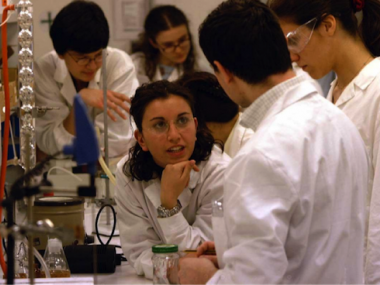Health: From Knowledge Capital to Local Specialisation
Edited on
09 October 201712 ideas for cities to take advantage of their potential linked to innovation and knowledge to strengthen health and socioeconomic areas. URBACT project 4D Cities gives some clues on the role that local authorities can play in this process.

The starting point of this article is the conviction that local governments should provide adequate capital investment and harmonization of existing knowledge in the city to best address its health policy challenges. That is, it has to know thoroughly what is available (institutions, studies, professionals, students, etc.) and what is the context (legislation, skills, geographical location, interest in studies, deficiencies in the system, etc.), in order to be then able to undertake useful and realistic measures. 4D Cities 12 ideas for an integrated local health system are:
1. The municipalities have to guide the process of collaboration between education institutions and centers of practical training to ensure consistent health learning locally. University, secondary and lifelong education should be articulated within a system focused on excellence that meet their own needs.
2. Knowledge related institutions are to provide job opportunities and also meet the requirements of the local health strategy, both public and private.
3. Harmonizing education locally - designing a local system of education, but with a much broader perspective. The system has to include interdisciplinary studies and respond to an ongoing training, always incorporating pathways both between the highest and lowest levels of expertise, as well as between different disciplines.
4. Cross-cutting policies of the various departments will provide a more coherent educational system that meets the needs of the health sector.
5. Undertake measures to attract students - providing information about the studies offered in the city, certifying and testing prior training, providing career opportunities in a specific discipline, etc.
6. Medium-sized cities that do not have a university or studies related to health located on their territory are to seek a model focused on health development and invest in knowledge facilities that are suited to their strategy. Agreements should also be closed with near-by local administrations or with other levels of governance that have educational structures on their territory.
7. Involve higher levels of public administration with the aim of supporting and qualifying an education and training model. Political support can come in the form of political decentralization and budget’s contribution.
8. To meet the human resource needs of the health services, all professions are equally important and not only those related to health and not just strictly medical. In addition, they will encourage business investment opportunities locally. The main types of health-related disciplines include: · Nursing, healthcare and healthcare management · Pharmacy · Technology and informatics · Community and social work · Business management and administration
9. Secondary and vocational training are to offer the studies above mentioned.
10. Life-long learning programs allow reducing unemployment by retraining in health sector needed skills.
11. Dual training has proved to be a formula that increases employment rates, in particular for young people.
12. A local health Innovation project is to promote interactions and collaborations among all stakeholders active in the field of health & knowledge, and develop specific roles and collaborations between them. Among them we can count: University with faculties of medical specialties, pharmacy, biomedical, nursing, health administration, etc; University hospitals with m with medical students in practice; Research companies and biotech and science parks; Secondary and vocational education of health and social care; Life-long learning and retraining centres, including health or medical studies, but also ICT studies according to the health information and communication needs.
Read more:
4D Cities minisite - URBACT website
Business Opportunities of Local Health Innovation - ![]() Download 4D_Cities_I_Output_Report_Business.pdf (7.27 MB)
Download 4D_Cities_I_Output_Report_Business.pdf (7.27 MB)
Submitted by admin on
